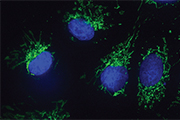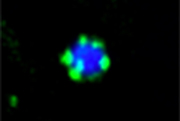Research
The Institute of Biochemistry and Molecular Biology is, together with the Institute of Molecular Medicine and Cell Research, located in the new building of the Centre for Biochemistry and Molecular Cell Research (ZBMZ). The institute belongs to the Theoretikum of the Faculty of Medicine at the Albert-Ludwigs-University of Freiburg. It is mainly devoted to basic research, but the work includes medical and biotechnological implications which have led to collaborations with clinical institutes and the industry. The major common themes of our research are the cellular mechanisms of targeting, transport, folding and modification of proteins. The studies are performed with single-cell organisms (yeast and prokaryotes) and cell cultures. The research is funded by a large number of grants, including grants from the German Science Foundation (DFG), the Collaborative Research Centre 1381 on “Dynamic Organization of Cellular Protein Machineries” (SFB 1381), the Centre for Integrative Biological Signalling Studies (Cluster of Excellence CIBSS) and the European Research Council (ERC).
Organization and Teaching
The Institute of Biochemistry and Molecular Biology consists of independent research groups with a common infrastructure (technical management, administration, mechanics, instrument shop, photographic laboratory). The Institute provides the complete teaching program in Biochemistry and Molecular Biology for students of Medicine, Dentistry and Molecular Medicine. It sustains numerous scientific and social interactions between the laboratories. One such activity is a seminar series, in which postdocs and PhD students of the Institute as well as Guest Speakers present their scientific findings. All seminars are given in English since the PhD students and postdocs of the Institute come from more than fifteen different countries.
News
Researchers have a better understanding of how our cells dispose of waste while developing ways to control it
A research team from Freiburg and Frankfurt has discovered how cells recognise and internally break down waste. The results are relevant for the development of therapies for diseases such as Alzheimer’s.
» more

Teacher of the Year Award for Nikolaus Pfanner
The biochemist is honored by the Faculty of Medicine Freiburg as Teacher of the Year for excellent teaching
» more

Protein kinase DYRK1A identified as a central integrator and synchronizer of the mitochondrial import machinery
Mitochondrial proteins are synthesized in the cytosol and are imported into mitochondria, where they are involved in converting the energy contained in our food into the cell-usable energy form adenosine triphosphate (ATP).
» more


